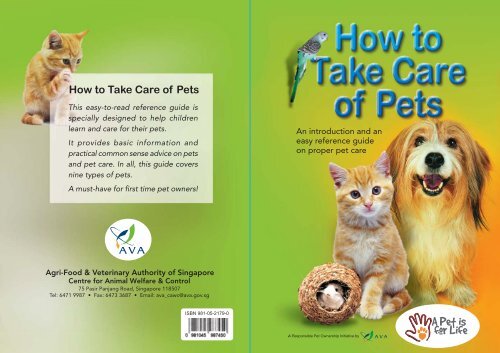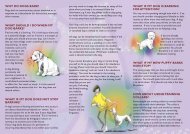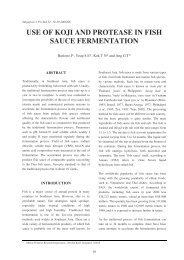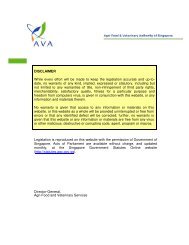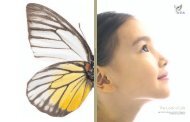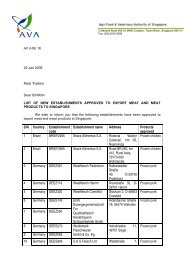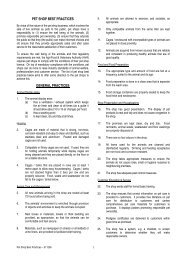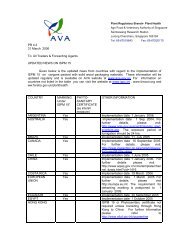How to Take Care of Pets - Agri-Food & Veterinary Authority of ...
How to Take Care of Pets - Agri-Food & Veterinary Authority of ...
How to Take Care of Pets - Agri-Food & Veterinary Authority of ...
You also want an ePaper? Increase the reach of your titles
YUMPU automatically turns print PDFs into web optimized ePapers that Google loves.
<strong>How</strong> <strong>to</strong> <strong>Take</strong> <strong>Care</strong> <strong>of</strong> <strong>Pets</strong><br />
This easy-<strong>to</strong>-read reference guide is<br />
specially designed <strong>to</strong> help children<br />
learn and care for their pets.<br />
It provides basic information and<br />
practical common sense advice on pets<br />
and pet care. In all, this guide covers<br />
nine types <strong>of</strong> pets.<br />
A must-have for first time pet owners!<br />
AVA<br />
<strong>Agri</strong>-<strong>Food</strong> & <strong>Veterinary</strong> <strong>Authority</strong> <strong>of</strong> Singapore<br />
Centre for Animal Welfare & Control<br />
75 Pasir Panjang Road, Singapore 118507<br />
Tel: 6471 9987 • Fax: 6473 3687 • Email: ava_cawc@ava.gov.sg<br />
ISBN 981-05-2179-0<br />
An introduction and an<br />
easy reference guide<br />
on proper pet care
<strong>Pets</strong> are big responsibilities and not<br />
everyone is able <strong>to</strong> take care <strong>of</strong> one. It is<br />
important <strong>to</strong> find out more before you<br />
make the decision <strong>to</strong> get a pet. This<br />
starter kit has been made especially<br />
<strong>to</strong> help you but you can also find out<br />
more by reading pet books and<br />
talking <strong>to</strong> people who know about pets.<br />
○ ○ ○ ○ ○ ○ ○ ○ ○ ○ ○ ○ ○ ○ ○ ○ ○ ○ ○ ○ ○ ○ ○ ○ ○ ○ ○ ○ ○ ○ ○ ○ ○ ○ ○ ○ ○ ○ ○<br />
○ ○ ○ ○ ○ ○ ○ ○ ○ ○ ○ ○ ○ ○ ○ ○ ○ ○ ○ ○ ○ ○ ○ ○ ○ ○ ○ ○ ○ ○ ○ ○ ○ ○ ○ ○ ○ ○ ○ ○<br />
○<br />
TABLE OF CONTENTS<br />
Dogs 1<br />
Cats 5<br />
Chinchillas 9<br />
Guinea pigs 13<br />
Hamsters 17<br />
Rabbits 21<br />
Birds 25<br />
Fish 29<br />
Terrapins 33<br />
What are<br />
dogs?<br />
Dogs are mammals and distant<br />
relatives <strong>of</strong> wolves. Dogs can<br />
smell, see and hear much better than<br />
we can. In the wild, these senses help<br />
them hunt for food. As pets, they get their<br />
food from their owners. There are many<br />
different types or breeds <strong>of</strong> dogs. Dogs <strong>of</strong><br />
different breeds can look very different and<br />
can behave differently <strong>to</strong>o.<br />
What are dogs like?<br />
Dogs like <strong>to</strong> have other dogs or humans around them.<br />
If they are alone for long periods, they become bored.<br />
They bark and make other sounds <strong>to</strong> communicate.<br />
Dogs also bark <strong>to</strong> get your attention. Dogs can be<br />
trained <strong>to</strong> do things, like fetch a ball or sit when you<br />
tell them <strong>to</strong>. Some can also be trained <strong>to</strong> rescue people<br />
or guide the blind. Dogs need<br />
exercise and a lot <strong>of</strong><br />
attention. In the wild, they<br />
follow a leader. In your<br />
house, they look <strong>to</strong> you<br />
as their leader. This<br />
means you need <strong>to</strong><br />
teach your dog what<br />
she should and should<br />
not do.<br />
An introduction and short guide<br />
Dogs as pets<br />
1
What type <strong>of</strong> dog<br />
should I get?<br />
If you live in a HDB flat or do not have<br />
much room at home, you should not get<br />
a big dog, like a Golden Retriever or<br />
German Shepherd Dog. Big dogs<br />
eat more and usually require more<br />
exercise. Some dogs are active<br />
whilst others prefer <strong>to</strong> rest<br />
quietly around the house.<br />
Before you decide on the<br />
breed <strong>of</strong> dog <strong>to</strong> get, you<br />
should read up and learn more<br />
about the various breeds <strong>of</strong><br />
dogs. Getting the right breed is<br />
very important.<br />
2<br />
What my pet dog needs<br />
• a dog licence<br />
• food & water<br />
• a food dish<br />
• a water dish<br />
• a comfortable place <strong>to</strong> rest<br />
• collar & leash<br />
• shampoo<br />
• nail clippers<br />
• grooming equipment<br />
for long hair (comb, brush)<br />
• <strong>to</strong>ys<br />
• muzzle (for some dogs)<br />
• and lots <strong>of</strong> time and love from me<br />
Big dogs like Golden<br />
Retrievers cannot be<br />
kept in HDB flats<br />
Dogs<br />
can live up <strong>to</strong><br />
20 years!<br />
<strong>How</strong> do I look after my dog?<br />
Puppies need three <strong>to</strong> four meals a day. Older dogs<br />
can be fed once or twice a day. It is good <strong>to</strong> bathe<br />
your dog once a week. They should not be bathed<br />
<strong>to</strong>o <strong>of</strong>ten or their skin and coat will become <strong>to</strong>o dry.<br />
Some dogs with long fur need you <strong>to</strong> comb and brush<br />
their fur <strong>of</strong>ten. Some dogs also need <strong>to</strong> be taken <strong>to</strong><br />
the groomer, who is like a pet hairdresser, or their coat<br />
can become very messy. When dogs are sick or need<br />
shots, they need <strong>to</strong> see an animal doc<strong>to</strong>r, a<br />
veterinarian. They may also need medicine <strong>to</strong> get rid <strong>of</strong> s<strong>to</strong>mach<br />
worms. A veterinarian will be able <strong>to</strong> answer your questions on your<br />
dog’s health.<br />
Dogs usually require more exercise than they can get in the house.<br />
You should therefore walk your dog one <strong>to</strong> three times a day. Always<br />
keep her leash on her collar or she could easily run where she is not<br />
allowed. During the walks, dogs will usually do their <strong>to</strong>ilet. You need<br />
<strong>to</strong> pick up their faeces. Leaving the faeces on the ground is<br />
irresponsible and against the law.<br />
It will dirty the environment and<br />
someone might step on it. You<br />
need <strong>to</strong> train your dog <strong>to</strong> go <strong>to</strong><br />
the <strong>to</strong>ilet only in her own <strong>to</strong>ilet<br />
corner at home or when she is on<br />
a walk.<br />
You should also train her <strong>to</strong> behave<br />
and not chew up your things or<br />
bark <strong>to</strong>o much. If you do not have<br />
the time <strong>to</strong> train her, she could<br />
become naughty and do things<br />
that she shouldn’t. Never leave<br />
your dog outside in hot weather<br />
or rain, as she will fall sick.<br />
Bathing a dog takes time<br />
3
What do dogs eat?<br />
Dogs eat any kind <strong>of</strong> meat, but did you know they also eat grains and<br />
fruits and vegetables? Dogs need a balanced diet just like the rest <strong>of</strong><br />
us so it isn’t a good idea <strong>to</strong> feed them only one type <strong>of</strong> food. Prepared<br />
dog food that you can buy from shops usually has<br />
everything that your pet needs. There’s both<br />
dry and canned/wet food. There is also<br />
special food for puppies, adult dogs and<br />
older dogs. Dogs need <strong>to</strong> drink water<br />
every day. Dogs will eat more than they<br />
need if given the chance. This means<br />
you shouldn’t feed your dog <strong>to</strong>o much,<br />
or give her <strong>to</strong>o many treats as rewards,<br />
or she will become fat and unhealthy.<br />
Should I let my dog breed?<br />
NO! Puppies may be cute but there are <strong>to</strong>o many dogs around and<br />
not enough good owners for all <strong>of</strong> them. We shouldn’t add <strong>to</strong> the<br />
problem by allowing our dog <strong>to</strong> breed. When our dogs breed they<br />
also experience stress. You should get your dog neutered or spayed.<br />
Neutering or spaying (also called sterilisation) is an operation done<br />
by the veterinarian that prevents your pet from having babies. It<br />
also makes your pet<br />
healthier. There are<br />
many dogs for adoption<br />
at the Society for<br />
Prevention <strong>of</strong> Cruelty <strong>to</strong><br />
Animals - go and visit<br />
<strong>to</strong>day!<br />
4<br />
What are<br />
CATs?<br />
Cats are meat-eating mammals.<br />
They are cousins <strong>of</strong> wild cats like<br />
lions and tigers. Cats can see and hear<br />
very well. This helps them <strong>to</strong> hunt for their<br />
food. As pets however, they depend on their<br />
owners for food. Cats have very flexible bodies<br />
and they can jump better and move around much<br />
faster than we can. The pet cat is different from<br />
wild cats as pet cats have lived closely with<br />
humans for a very long time. There are many<br />
different types <strong>of</strong> pet cats. Some, like the<br />
Persians, have long fur. Some are bigger and<br />
some smaller. Cats that do not belong <strong>to</strong> anyone<br />
are called stray or feral cats.<br />
What are cats like?<br />
Pet cats can be very independent and do not need<br />
your attention as much as say the pet dog. That does<br />
not mean you can ignore or forget about them! Cats<br />
might not come <strong>to</strong> you when you call if they are not in<br />
the mood. They take time <strong>to</strong> train so you must be very<br />
patient with your cat. Like people,<br />
one cat is different from the<br />
next. They can also be very<br />
playful and are easily excited<br />
by moving objects. Cats <strong>of</strong>ten<br />
clean themselves with their<br />
<strong>to</strong>ngue, especially after each<br />
meal. Cats also sleep a lot -<br />
up <strong>to</strong> 18 hours a day!<br />
An introduction and short guide<br />
CATs as pets 5
<strong>How</strong> do I look after<br />
my cat?<br />
Cats don’t really need baths<br />
unless they get dirty or have<br />
fleas - these are insects that<br />
can make your pet itchy and<br />
sick. Some cats with long fur<br />
need you <strong>to</strong> groom or brush<br />
their fur. You <strong>to</strong> clean their<br />
litterboxes daily (cats do not<br />
like <strong>to</strong> use dirty ones).<br />
Cats will usually have enough<br />
exercise at home. If cats are<br />
kept in cages for most <strong>of</strong> the<br />
day, they need <strong>to</strong> be allowed<br />
out <strong>to</strong> play. You can also give<br />
your cat <strong>to</strong>ys <strong>to</strong> play with.<br />
6<br />
Clean your cat’s<br />
litterbox every day<br />
When cats are sick or need shots, they<br />
need <strong>to</strong> see an animal doc<strong>to</strong>r, a<br />
veterinarian. They may also need<br />
medicine <strong>to</strong> get rid <strong>of</strong> worms. A<br />
veterinarian will be able <strong>to</strong> answer<br />
your questions on your cat’s health.<br />
What my pet cat needs<br />
• food & water<br />
• a food dish<br />
• a water dish/bottle<br />
• a comfortable place <strong>to</strong> rest<br />
• a litter box (which it uses as a <strong>to</strong>ilet)<br />
• grooming equipment, if it has long<br />
hair (comb, brush)<br />
• shampoo<br />
• nail clippers<br />
• <strong>to</strong>ys and a scratching post<br />
• and lots <strong>of</strong> time and love<br />
from me!<br />
You should keep your<br />
cats indoors<br />
The outdoors is not a good<br />
place for your cat. Keep your<br />
cat indoors so that she doesn’t<br />
become sick or get in<strong>to</strong> an<br />
accident.<br />
Outside, she might also<br />
disturb your neighbours or get<br />
in<strong>to</strong> fights with other cats.<br />
Cats<br />
can live up <strong>to</strong><br />
20 years!<br />
Cats with long fur need <strong>to</strong> be brushed regularly<br />
A cat is enjoying a nap in the<br />
safety <strong>of</strong> his home<br />
7
What do cats eat?<br />
Cats eat any kind <strong>of</strong> meat, but<br />
did you know they also eat<br />
grains and fruits and<br />
vegetables? Cats need a<br />
balanced diet just like the rest<br />
<strong>of</strong> us so it isn’t a good idea<br />
<strong>to</strong> feed it only one sort <strong>of</strong><br />
food. Prepared cat food that<br />
you can buy from shops<br />
usually has everything that<br />
your pet needs <strong>to</strong> eat.<br />
Cats need <strong>to</strong> drink water every day. Most cats only eat what they<br />
need but it is good not <strong>to</strong> feed your cat <strong>to</strong>o much or she will get<br />
fat and be unhealthy.<br />
Should I let my cat breed?<br />
NO! There are <strong>to</strong>o many cats around and not enough good owners<br />
for all <strong>of</strong> them. We shouldn’t add <strong>to</strong> the problem by allowing our<br />
cat <strong>to</strong> breed. When our cats breed they also experience stress.<br />
You should get your cat<br />
neutered or spayed.<br />
Neutering or spaying (also<br />
called sterilisation) is an<br />
operation done by the<br />
veterinarian that prevents<br />
your pet from having babies.<br />
It also makes your pet<br />
healthier.<br />
8<br />
Don’t feed your cat <strong>to</strong>o much.<br />
Otherwise, it will get fat & unhealthy.<br />
Kittens may be cute but they all<br />
need a good home<br />
What are<br />
Chinchillas?<br />
Chinchillas are rodents just like<br />
hamsters. In the wild, they live high<br />
up on the mountains <strong>of</strong> South America,<br />
where it is really, really cold. That is why they<br />
have very thick fur. Like all rodents, chinchillas<br />
have teeth that grow throughout their lives. They<br />
use them <strong>to</strong> chew on plant matter like plant roots<br />
and bark. There are very few chinchillas in the<br />
wild right now. They are “endangered” because<br />
they could go extinct (die out like the dinosaurs)<br />
if people continue <strong>to</strong> hunt and kill them for their<br />
wonderful fur. No one is supposed <strong>to</strong> hunt them<br />
anymore but some people still do it illegally. Pet<br />
chinchillas are now bred on farms.<br />
What are<br />
chinchillas like?<br />
Because <strong>of</strong> their thick<br />
fur coat, chinchillas<br />
need cool surroundings.<br />
Singapore’s<br />
weather is <strong>to</strong>o hot for<br />
them. If it gets <strong>to</strong>o<br />
warm, chinchillas could<br />
faint or die. At home, it<br />
is best <strong>to</strong> switch on the<br />
An introduction and short guide<br />
CHINCHILLAS as pets<br />
9
air conditioner or fan <strong>to</strong> lower the temperature and<br />
humidity (the amount <strong>of</strong> water vapour in the air).<br />
Chinchillas can move around very fast and hop quite<br />
high. Chinchillas sleep in the day and are<br />
awake at night. Chinchillas can be<br />
friendly but they also like some quiet<br />
time alone by themselves. They<br />
do not like <strong>to</strong> be cuddled <strong>to</strong>o<br />
much. Chinchillas become<br />
stressed easily. You need <strong>to</strong> be<br />
really gentle and patient with<br />
your chinchilla or she could<br />
fall ill. Put her cage someplace<br />
quiet and comfortable.<br />
10<br />
What my pet<br />
chinchilla needs<br />
• a cage with a solid floor,<br />
NOT one with wires at the bot<strong>to</strong>m<br />
• food & water<br />
• water bottle<br />
• food dish<br />
• bedding such as aspen<br />
(NOT pine shavings)<br />
• dust (for bathing)<br />
• <strong>to</strong>ys (such as a wheel or tunnels)<br />
• lots <strong>of</strong> love and time from me!<br />
Chinchillas<br />
can live up <strong>to</strong><br />
15 years!<br />
<strong>How</strong> do I look after my<br />
chinchilla?<br />
Chinchillas need <strong>to</strong> be watched carefully when you let them out <strong>of</strong><br />
their cage. It is very difficult <strong>to</strong> <strong>to</strong>ilet train a chinchilla so you will<br />
need <strong>to</strong> pick up her droppings every time she comes out <strong>to</strong> play.<br />
Chinchillas also like <strong>to</strong> chew on things so make sure she is not<br />
biting your books, wires or your table! If they are <strong>to</strong>o excited, it<br />
might be difficult <strong>to</strong> get them back inside the cage. If you try <strong>to</strong><br />
catch them, they might get scared and run further away.<br />
The bedding or litter needs <strong>to</strong> be changed every few days or it<br />
will smell. Your chinchilla should have a cage that is tall enough for<br />
her <strong>to</strong> jump and play in. You can feed your chinchilla twice a day.<br />
Try <strong>to</strong> keep <strong>to</strong> the same time <strong>of</strong> feeding or she could get upset.<br />
Change the water in her bottle every day so it is fresh and clean.<br />
Chinchillas do not bathe in water like you do. They take sand baths.<br />
Place bath sand (you can get this from a pet shop) in a container<br />
for your chinchilla <strong>to</strong> have a sand bath. Your<br />
chinchilla will roll around in the sand <strong>to</strong> get<br />
clean.<br />
Chinchillas don’t bathe in water.<br />
They take sand baths.<br />
Chinchillas can also fall sick and<br />
when that happens, they need <strong>to</strong><br />
see the veterinarian, an animal<br />
doc<strong>to</strong>r. A veterinarian will be able<br />
<strong>to</strong> answer your questions on your<br />
chinchilla’s health. <strong>How</strong>ever,<br />
because the chinchilla is a new pet<br />
in Singapore, it may be that not<br />
all veterinarians will be familiar with<br />
them.<br />
11
What do chinchillas eat?<br />
12<br />
Chinchillas are herbivores. This means they eat plant matter<br />
and do not eat meat. Chinchillas need a balanced diet, so<br />
you should not feed your chinchilla only one type <strong>of</strong> food.<br />
Chinchillas can be fed pellets that are especially made for<br />
them.<br />
Chinchillas also eat dried grass, called hay. You can buy this<br />
at the petshop. It is best not <strong>to</strong> pick any grass outside as they<br />
could have been sprayed with chemicals or dirtied by other<br />
animals.<br />
You can also feed them fresh vegetables and fruits such as<br />
carrot, xiao pai chai or apple. Chinchillas like raisins and other<br />
dried fruits and you can give them these as treats. Feed them<br />
only 2-3 pieces a day. Too many treats will give your chinchilla<br />
a tummy ache.<br />
Chinchillas like raisins and other<br />
dried fruits but <strong>to</strong>o much could<br />
make them sick<br />
What are<br />
guinea pigs?<br />
Guinea pigs are rodents like<br />
hamsters, mice, chinchillas and<br />
porcupines. Rodents have teeth that<br />
grow throughout their lives. There are different<br />
breeds <strong>of</strong> guinea pigs. Some have short, smooth<br />
fur whilst others have such long fur that it covers<br />
their eyes! There are even guinea pigs with curly<br />
fur. Guinea pigs have a very good sense <strong>of</strong> smell<br />
and hearing. These senses help them find food<br />
and escape from preda<strong>to</strong>rs. Guinea pigs grow<br />
<strong>to</strong> about the size <strong>of</strong> a small rabbit.<br />
What are guinea<br />
pigs like?<br />
Guinea pigs are active in the night and rest in the<br />
day. They are timid and shy animals but do not usually<br />
bite. When they hear loud noises, they will quickly<br />
hide in a corner or stand very<br />
still. Guinea pigs usually do<br />
not like <strong>to</strong> be picked up.<br />
They prefer <strong>to</strong> play on the<br />
ground or sit on your<br />
lap. They will need a<br />
gentle and patient<br />
owner who enjoys<br />
watching and petting<br />
them. In the wild, guinea<br />
pigs live in groups. In<br />
your home, they would not<br />
An introduction and short guide<br />
guinea pigs as pets<br />
13
want <strong>to</strong> be left alone for <strong>to</strong>o long or ignored. Guinea pigs make<br />
squealing noises when it is feeding time. Guinea pigs use their<br />
saliva and their paws <strong>to</strong> clean their fur.<br />
What do guinea<br />
pigs eat?<br />
Guinea pigs are herbivores. This means<br />
they eat plant matter and do not eat<br />
meat. Guinea pigs need a balanced<br />
diet, just like the rest <strong>of</strong> us. There are<br />
pellets especially made for guinea pigs.<br />
Make sure the guinea pig food contains<br />
Vitamin C. This is important for your guinea pig because they cannot<br />
make their own. S<strong>to</strong>re the food in an airtight container and a cool<br />
place properly, as the food will lose the Vitamin C after a while.<br />
Guinea pigs also like hay (dried grass), fresh vegetables and fruits<br />
like carrots, grapes and oranges. But do not feed your guinea pig<br />
<strong>to</strong>o much vegetable or she will get a<br />
s<strong>to</strong>machache. Give your guinea<br />
pig hay that is especially for<br />
pets. Grass from outside might<br />
be sprayed with poisonous<br />
chemicals or dirtied by other<br />
animals. Do not <strong>to</strong> feed your<br />
guinea pig <strong>to</strong>o much food<br />
or she will get fat. Guinea<br />
pigs need fresh, clean water<br />
every day.<br />
14<br />
Guinea pigs like <strong>to</strong> eat<br />
dried grass, fresh<br />
vegetables and fruits<br />
<strong>How</strong> many shall I get?<br />
Because they like <strong>to</strong> have company, you might<br />
want <strong>to</strong> get two guinea pigs <strong>of</strong> the same<br />
sex. Rabbits may not make good friends<br />
for them as they can kick a guinea pig.<br />
Don’t breed<br />
your guinea pigs<br />
What my pet<br />
guinea pig needs<br />
• a cage (with a solid floor is best!)<br />
• food & water<br />
• a water bottle<br />
• a food dish<br />
• bedding<br />
• <strong>to</strong>ys<br />
• grooming equipment (comb, brush)<br />
if my guinea pig has long fur<br />
• nail clippers<br />
• lots <strong>of</strong> love and attention from me!<br />
Guinea<br />
pigs<br />
can live from<br />
4 - 8 years!<br />
Guinea pigs usually spend most <strong>of</strong> their lives in their cages<br />
so it is important <strong>to</strong> make it as interesting and as<br />
comfortable as possible.<br />
15
<strong>How</strong> do I look after<br />
my guinea pig?<br />
Guinea pigs have very small legs and<br />
feet compared <strong>to</strong> rabbits. It is<br />
dangerous for them <strong>to</strong> stay in<br />
cages with bars on the<br />
bot<strong>to</strong>m. Their legs can get<br />
stuck in them. You can get<br />
a cage with a solid bot<strong>to</strong>m<br />
or make sure they have a<br />
large board <strong>to</strong> sleep on.<br />
You need <strong>to</strong> change their<br />
bedding every day or it will<br />
be smelly. Make sure that<br />
your guinea pig has fresh food<br />
and water every day. You can<br />
feed them once or twice a day.<br />
If your guinea pig is sick, you need <strong>to</strong> bring her <strong>to</strong> the veterinary<br />
clinic where she can see the animal doc<strong>to</strong>r, called a veterinarian,<br />
or vet for short. A vet will be able <strong>to</strong> answer any questions you<br />
have on your guinea<br />
pig’s health. When their<br />
nails grow <strong>to</strong>o long, have<br />
a vet or someone who<br />
knows how <strong>to</strong> trim your<br />
guinea pig’s nails. Bathe<br />
your guinea pig when<br />
she is dirty but not <strong>to</strong>o<br />
<strong>of</strong>ten.<br />
16<br />
You may need <strong>to</strong><br />
brush your guinea<br />
pig regularly if it<br />
has long fur<br />
What are<br />
hamsters?<br />
Hamsters are rodents like guinea<br />
pigs, mice, gerbils and rats.<br />
Rodents have teeth that grow<br />
throughout their lives. There are four common<br />
types <strong>of</strong> pet hamsters - campbells, roborovskis,<br />
winter whites and syrians. The first three types<br />
are smaller. They are also called dwarf hamsters.<br />
Syrians are also called golden hamsters.<br />
What are<br />
hamsters like?<br />
Hamsters sleep in the day and wake up at night.<br />
Hamsters can carry a lot <strong>of</strong> food in their cheek<br />
pouches. They s<strong>to</strong>re this food somewhere <strong>to</strong> eat later.<br />
Hamsters can move very fast and may not like <strong>to</strong> be<br />
<strong>to</strong>uched. Some hamsters bite. Their bites are deep<br />
and painful.<br />
<strong>How</strong>ever, if someone has played with the hamster<br />
since it was young, it will usually let people hold it.<br />
Hamsters bite when they are scared or when they are<br />
not held properly. You need <strong>to</strong> be careful with<br />
hamsters because they can get injured if they fall or<br />
are squeezed <strong>to</strong>o tightly.<br />
An introduction and short guide<br />
hamsters as pets<br />
17
Which type <strong>of</strong> hamster<br />
should I get?<br />
All types <strong>of</strong> hamsters require<br />
care from their owners. There<br />
are many different colours <strong>of</strong><br />
hamsters. The roborovski<br />
however has only one fur<br />
colour - sandy brown. Some<br />
<strong>of</strong> the smaller hamsters move<br />
very fast and are usually more<br />
fun <strong>to</strong> look at than <strong>to</strong> play<br />
with.<br />
<strong>How</strong> many should I get?<br />
Different types <strong>of</strong> hamsters do not usually get along. Syrian<br />
hamsters like <strong>to</strong> be alone. They will fight with other hamsters living<br />
with them. It is not true that they are lonely without another hamster<br />
friend. This means it’s best <strong>to</strong> get one syrian hamster if you only<br />
have one cage. Dwarf hamsters can sometimes get along with<br />
others <strong>of</strong> the same type but there are also<br />
some hamsters that would rather be<br />
alone. If you are keeping two hamsters<br />
<strong>to</strong>gether, give them plenty <strong>of</strong> hiding<br />
places and <strong>to</strong>ys and check your<br />
hamsters <strong>of</strong>ten for any wounds.<br />
18<br />
Roborovski hamsters are the<br />
smallest type <strong>of</strong> pet hamster. They<br />
move very fast.<br />
What do hamsters eat?<br />
Hamsters are omnivores. This means they eat<br />
both plant matter and meat. A complete<br />
hamster food made up <strong>of</strong> seeds and dried<br />
fruits and vegetables is usually best. Small<br />
amounts <strong>of</strong> fresh food like green leafy<br />
vegetables, carrots, corn, apples and grapes<br />
can be fed. Hamsters love sunflower seeds<br />
but <strong>to</strong>o many will make them ill.<br />
<strong>How</strong> do I hold a<br />
hamster?<br />
Young hamsters are usually more jumpy<br />
and difficult <strong>to</strong> hold. Pick hamsters up by<br />
cupping them gently and slowly in your<br />
hands. It is important <strong>to</strong> be careful and<br />
gentle so that you do not scare the hamster.<br />
Hold the hamster over the cage so that if it jumps<br />
suddenly, it won’t be hurt. Hamsters hardly ever stay still. As<br />
hamsters grow older they may slow down and be easier <strong>to</strong> hold.<br />
<strong>How</strong> do I look after<br />
my hamster?<br />
Change the bedding at least once a week. The cage can be washed<br />
with water and vinegar <strong>to</strong> remove stains. You can feed your hamster<br />
once a day, depending on how much you put in. Hamsters will<br />
“pouch” it (put it in their cheek pouches) or collect it in a corner.<br />
Water needs <strong>to</strong> be supplied all the time. Hamsters clean themselves<br />
with their saliva and their paws. You don’t have <strong>to</strong> bathe them.<br />
19
Should I breed<br />
my hamster?<br />
No! Hamsters can get pregnant<br />
when they are 6 weeks old and can<br />
have many babies at one time - up<br />
<strong>to</strong> 20! It is usually not easy <strong>to</strong> find<br />
good new homes for all the<br />
hamster babies. It is not a good<br />
idea <strong>to</strong> breed your pets. Hamster mothers may<br />
eat their young if the babies are sickly or if<br />
she is disturbed. It is also important not <strong>to</strong><br />
<strong>to</strong>uch the babies as this changes<br />
the scent on them.<br />
21<br />
What my pet<br />
hamster needs<br />
Hamsters<br />
can live 2-4 years!<br />
• a cage<br />
• food & water<br />
• a water bottle<br />
• a wheel (one without any holes would be best)<br />
• bedding (wood shavings for them <strong>to</strong> dig, sleep and play in)<br />
• a little hamster house <strong>to</strong> hide in<br />
• a food dish<br />
• lots <strong>of</strong> love and time from me!<br />
Hamsters live their entire lives in their cages so it is important<br />
<strong>to</strong> make it as interesting and as comfortable as possible.<br />
Newspaper, sawdust and sand are not good bedding. Wood<br />
shavings and aspen are best.<br />
What are<br />
rabbits?<br />
Rabbits are plant-eating mammals or<br />
herbivores. They belong <strong>to</strong> a group<br />
<strong>of</strong> animals called the lagomorphs. Rabbits’ teeth<br />
grow throughout their lives. Rabbits have a very<br />
good sense <strong>of</strong> smell and hearing. These senses<br />
help it find food and escape from preda<strong>to</strong>rs.<br />
There are many different types <strong>of</strong> pet rabbits.<br />
They can have long or short fur and long or short<br />
ears. Some rabbits are as big as a medium sized<br />
dog while others are as small as a guinea pig.<br />
What are rabbits like?<br />
Rabbits wake up at dawn (the time when the sun rises)<br />
and dusk (the time when the sun sets). They clean<br />
themselves with their paws and saliva. Rabbits are<br />
curious animals but can be scared easily by loud noises<br />
or sudden movements. When scared, rabbits may kick<br />
or bite. Rabbits usually do not like <strong>to</strong> be<br />
picked up. They prefer <strong>to</strong> play on the<br />
ground. Most rabbits will be friendly if<br />
people have played with them from<br />
young. Rabbits need a patient and<br />
gentle owner. Rabbits also need <strong>to</strong> be<br />
alone sometimes <strong>to</strong> rest and play. As<br />
your rabbit’s teeth keep on growing,<br />
she will need <strong>to</strong> chew on things <strong>to</strong> keep<br />
them trim.<br />
An introduction and short guide<br />
Rabbits as pets<br />
20
22<br />
What my rabbit needs<br />
• a cage<br />
• food & water<br />
• a water bottle<br />
• a food dish<br />
• bedding<br />
• <strong>to</strong>ys<br />
• litterbox<br />
• grooming equipment<br />
for long fur (comb and<br />
brush)<br />
• nail clippers<br />
• lots <strong>of</strong> love and attention from me!<br />
Rabbits usually live most <strong>of</strong> their lives<br />
in their cages so it is important <strong>to</strong><br />
make it as interesting and as<br />
comfortable as possible.<br />
All types <strong>of</strong> rabbits have almost the<br />
same needs. Bigger rabbits will need<br />
more room and more food. Rabbits<br />
with long fur will need you <strong>to</strong> comb<br />
and brush their fur <strong>of</strong>ten. Different<br />
rabbits, just like people, have different<br />
personalities.<br />
Rabbits<br />
can live up <strong>to</strong><br />
around 8 years!<br />
Which type <strong>of</strong><br />
rabbit should<br />
I get?<br />
<strong>How</strong> many should I get?<br />
Rabbits like <strong>to</strong> have company. It’s best <strong>to</strong> get two<br />
female rabbits as two male rabbits will fight. One<br />
male and one female rabbit will have babies and<br />
that’s not a good idea.<br />
<strong>How</strong> do I hold a rabbit?<br />
If you need <strong>to</strong> pick up your rabbit, remember <strong>to</strong> support her bot<strong>to</strong>m<br />
as you pick her up or she will become very scared. Put one hand<br />
around her body and another one below her bot<strong>to</strong>m. Hold her<br />
near your body. If she gets scared and starts <strong>to</strong><br />
kick, put her down gently and let her calm<br />
down before trying again. Never pick up a<br />
rabbit by her ears! That would hurt her.<br />
<strong>How</strong> do I look<br />
after my rabbit?<br />
Keep your rabbit in a cool place. If your<br />
rabbit is <strong>to</strong>o hot, she may fall ill. If your<br />
rabbit has a cage that does not have<br />
a flat, solid floor, give her an old rug<br />
or board <strong>to</strong> sit on. Wire floors are<br />
uncomfortable for rabbits and can<br />
damage their feet. You can litter train<br />
your rabbit so that she does not do<br />
her <strong>to</strong>ilet everywhere. You will need <strong>to</strong> change her bedding or litter<br />
paper under her cage every day. If your rabbit is sick, bring her <strong>to</strong><br />
the veterinary clinic where she can see the animal doc<strong>to</strong>r, called a<br />
veterinarian. A veterinarian will be able <strong>to</strong> answer any questions<br />
you have on your rabbit’s health. Rabbits clean their own fur so<br />
they do not need a bath unless they are very dirty. You can teach<br />
some rabbits <strong>to</strong> come when you call their name.<br />
23
Should I breed<br />
my rabbit?<br />
No! Rabbits can have many babies at one<br />
time - up <strong>to</strong> 10! It is usually not easy <strong>to</strong> find<br />
good new homes for all the baby rabbits. It is<br />
not a good idea <strong>to</strong> breed your pets because<br />
there are other rabbits already looking for good<br />
homes <strong>to</strong> go <strong>to</strong>. Neutering or spaying (also called sterilisation) is<br />
an operation done by the veterinarian that prevents your pet from<br />
having babies.<br />
What do rabbits eat?<br />
Rabbits are herbivores. This means they eat plant matter and do<br />
not eat meat. Rabbits need a balanced diet, just like the rest <strong>of</strong> us<br />
so you should not feed your rabbit<br />
only carrots or one type <strong>of</strong> food.<br />
Rabbits can be fed pellets that are<br />
especially made for rabbits. You<br />
can also feed her some fresh<br />
vegetables and fruits such as<br />
carrot, xiao pai chai or apple. Do<br />
not feed her <strong>to</strong>o much vegetables<br />
or she might get a s<strong>to</strong>machache.<br />
Give your rabbit the chance <strong>to</strong><br />
exercise so she won’t get fat.<br />
Some rabbits eat <strong>to</strong>o much<br />
because they are bored in their<br />
cages. Provide gnawing sticks or<br />
rabbit-safe <strong>to</strong>ys for your rabbit.<br />
Rabbits need plenty <strong>of</strong> fresh,<br />
clean water every day.<br />
24<br />
What are<br />
birds?<br />
Birds are warm-blooded animals<br />
with feathers. Most birds can fly<br />
but some, like the ostrich and penguin,<br />
cannot. Birds have a good sense <strong>of</strong> sight. This<br />
helps them fly, look for food and escape from<br />
preda<strong>to</strong>rs. Birds lay eggs instead <strong>of</strong> giving birth<br />
<strong>to</strong> live young. There are many different types<br />
<strong>of</strong> birds. Some are big but some are really tiny.<br />
Some popular pet birds include the budgerigar,<br />
canary, finch, parakeet, cockatiel and the Indian<br />
hill mynah. Not all birds make good pets. Some<br />
are <strong>to</strong>o big and some can be rather noisy. Other<br />
birds are endangered with only small numbers<br />
left in the wild.<br />
What are birds like?<br />
Birds like <strong>to</strong> have company. Some birds can sing really<br />
beautifully but others make loud noises that can be<br />
irritating. Birds can be scared <strong>of</strong> people, including you.<br />
You will need <strong>to</strong> spend time with your bird <strong>to</strong> gain her<br />
trust. Some birds moult or change their feathers at<br />
certain times <strong>of</strong> the year. They may look very messy<br />
but they will soon grow a nice new set <strong>of</strong> feathers.<br />
Birds also groom themselves by using their beaks <strong>to</strong><br />
run through their feathers. They also enjoy taking baths<br />
in shallow puddles. Birds are curious and some will play<br />
with simple <strong>to</strong>ys like mirrors and balls. Some birds are<br />
also really smart and you can train them <strong>to</strong> do simple<br />
“tricks”. You might know <strong>of</strong> a parrot that talks, but not<br />
every bird can talk. Parrots and mynahs learn <strong>to</strong> talk<br />
more easily than other types <strong>of</strong> birds.<br />
An introduction and short guide<br />
birds as pets<br />
25
<strong>How</strong> do I look<br />
after my bird?<br />
You will need <strong>to</strong> clean your bird’s cage every day. Disinfect the<br />
cage weekly. Feed your bird at about the same time every day, as<br />
they like <strong>to</strong> have a fixed timetable. Some birds will take <strong>of</strong>f the<br />
hard outer parts <strong>of</strong> the seeds (called husks) and eat only the insides.<br />
You will have <strong>to</strong> throw away the empty husks in the feed bowl<br />
every day and replace it with fresh food. If the bowl looks full,<br />
check that there is food and not just empty husks.<br />
Give your bird a shallow bowl <strong>of</strong> water<br />
for her <strong>to</strong> bathe in. It might be difficult<br />
<strong>to</strong> tell if your bird is sick by how it looks.<br />
Watch your pet carefully <strong>to</strong> see if she is<br />
eating properly. She might also not take<br />
a bath if she is sick. When she is sick<br />
(e.g. very quiet, not eating or all fluffed<br />
up) bring her <strong>to</strong> a veterinarian, an animal<br />
doc<strong>to</strong>r. A veterinarian will be able <strong>to</strong><br />
answer your questions on your bird’s<br />
health.<br />
Birds like things <strong>to</strong> remain the same in their home. They might be<br />
scared <strong>of</strong> strangers they’ve never seen before. You can talk <strong>to</strong> your<br />
bird <strong>to</strong> let it get used <strong>to</strong> you. You will need <strong>to</strong> be very patient with<br />
her. You can train some birds <strong>to</strong> sit or perch on your finger but you<br />
will have <strong>to</strong> do this step by step. Start by holding<br />
out food <strong>to</strong> her so that she gets used <strong>to</strong><br />
your hand. Do not make sudden<br />
movements around your bird or you<br />
might scare her. You may have <strong>to</strong> trim<br />
your bird’s claws if they grow <strong>to</strong>o long.<br />
Have someone (preferably a veterinarian)<br />
show you how <strong>to</strong> do it.<br />
26<br />
What my<br />
bird needs<br />
• an aviary (a cage for birds)<br />
• food & water<br />
• a food dish<br />
• a water dish<br />
• bird bath<br />
• perches<br />
• <strong>to</strong>ys (mirrors, ladders and others)<br />
• cuttlefish bone/calcium carbonate<br />
• grit (for some birds)<br />
• nail trimmer<br />
• cage cover<br />
• lots <strong>of</strong> love and time from me!<br />
cannot find pic <strong>of</strong><br />
pet bird fro our<br />
library. all are the<br />
‘wild, endangered<br />
type’<br />
These birds can live a long<br />
time and can make a lot <strong>of</strong><br />
noise<br />
Some Birds live<br />
a few years but<br />
others can live<br />
60 - 70 years!<br />
Birds live their entire lives in their cages so it is important<br />
<strong>to</strong> make their homes as interesting and as comfortable as<br />
possible. Your pet should have enough space <strong>to</strong> stretch<br />
her wings and fly short distances.<br />
27
What do birds eat?<br />
The many different types <strong>of</strong> birds do not all eat<br />
the same thing. Find out exactly what your<br />
pet bird eats. You can do this by reading<br />
books on the type <strong>of</strong> bird you have or<br />
by asking people who know about birds.<br />
Many birds are omnivores, which means<br />
they eat both plants and meat. Different<br />
seed mixtures and feed pellets are sold<br />
at pet s<strong>to</strong>res. See whether there is one that<br />
suits your bird. If not, you will need <strong>to</strong> find out<br />
how <strong>to</strong> mix one for her.<br />
Birds need a balanced diet, just like the rest<br />
<strong>of</strong> us so it isn’t a good idea <strong>to</strong> feed her<br />
only one sort <strong>of</strong> food, even if she likes it<br />
very much. Birds also eat fresh foods like<br />
green vegetables, carrots and fruits. But<br />
do not feed your pet <strong>to</strong>o much fresh<br />
vegetables/fruits or she might get<br />
diarrhoea.<br />
Some birds also eat mealworms and crickets.<br />
Birds also need a piece <strong>of</strong> cuttlefish bone (this<br />
can be bought at pet s<strong>to</strong>res), which provides<br />
them with calcium. Birds need fresh water<br />
every day. Some birds might also need<br />
<strong>to</strong> be given grit. This is something like<br />
sand and helps the bird digest its food.<br />
28<br />
Mixed seeds<br />
Millet seeds<br />
Mealworms<br />
What are<br />
fish?<br />
Fish are cold-blooded animals that<br />
live in water and use fins <strong>to</strong> move<br />
around. They live in oceans, lakes,<br />
rivers and streams around the world.<br />
There are many different types <strong>of</strong> fish<br />
but not all <strong>of</strong> them are kept as pets. Fish, like<br />
the rest <strong>of</strong> us, need oxygen. They take in oxygen<br />
from the water they live in, using their gills. This<br />
is something that we cannot do. Very few fishes<br />
have lungs and lungfishes are usually not kept<br />
as pets. Fish cannot get the oxygen they need<br />
from the air, so do not ever take them out <strong>of</strong><br />
water unless you really have <strong>to</strong>, like when you<br />
are cleaning their tank. Even then, you should<br />
not take them out for more than a few seconds.<br />
What are fishes like?<br />
Fish cannot play with you like a dog or cat can, but<br />
they are fun and interesting <strong>to</strong> watch. Some people<br />
also find it relaxing <strong>to</strong> see the fish move through the<br />
water. Many people add different types <strong>of</strong> plants <strong>to</strong><br />
make the tank look prettier. Fish do not make any<br />
noise. They do not<br />
have eyelids so fish<br />
cannot close their<br />
eyes. They sleep with<br />
their eyes open.<br />
Some fish can even<br />
sleep while they are<br />
moving!<br />
An introduction and short guide<br />
Fishes as pets 29
What kind <strong>of</strong><br />
fish should I get?<br />
The fish you decide <strong>to</strong> get should be one<br />
that you can look after properly. Some<br />
fish are really big and you might not have<br />
enough space for them. Some fish can<br />
get along with other fish but some prefer<br />
<strong>to</strong> stay on their own. Marine fishes (those<br />
that live in saltwater) are<br />
usually more difficult and<br />
expensive <strong>to</strong> keep than<br />
30<br />
freshwater fishes. Common freshwater aquarium<br />
fishes include tetras, corydoras, Siamese fighting<br />
fish, goldfish, guppies, swordtails and platies.<br />
What my fish needs<br />
• a tank<br />
• air pump<br />
• filtration system<br />
• fish food<br />
• lots <strong>of</strong> space <strong>to</strong> swim around<br />
• hiding places<br />
• cleaning equipment<br />
• others (light, water heater, etc.)<br />
• lots <strong>of</strong> attention from me!<br />
Many owners also like <strong>to</strong><br />
decorate their tanks with<br />
s<strong>to</strong>nes. Some people like <strong>to</strong><br />
put in gravel, s<strong>to</strong>nes and water<br />
plants. These will give the fish<br />
a place <strong>to</strong> hide and rest.<br />
This kind <strong>of</strong> bowl is pretty but<br />
is not a good home for fish<br />
Marine fishes, such as the clownfish, are much harder<br />
<strong>to</strong> take care <strong>of</strong> than most freshwater fishes<br />
<strong>How</strong> do I look after<br />
my fish?<br />
It is important <strong>to</strong> keep the<br />
water in your fish tank<br />
clean. You may need <strong>to</strong><br />
change the water every<br />
week, depending on the<br />
type <strong>of</strong> fish and<br />
equipment you have.<br />
Do not change all the<br />
water at one time. Leave<br />
at least half or more <strong>of</strong> the water in the tank. Scrub the sides <strong>of</strong> the<br />
tank <strong>to</strong> remove algae. A filter will help <strong>to</strong> keep your tank clean.<br />
There are many different types <strong>of</strong> filters. These are grouped as<br />
mechanical, chemical and biological filters. Some get rid <strong>of</strong> dirt<br />
while others remove chemicals or substances that might harm your<br />
fish.<br />
The health <strong>of</strong> your fish depends on the water they live in. To make<br />
sure that the water contains the right amount <strong>of</strong> different chemicals,<br />
you need <strong>to</strong> do some tests on the water regularly. Common tests<br />
done are for pH, nitrates, ammonia and hardness <strong>of</strong> the water.<br />
You can feed your fish once a day. Do not feed them <strong>to</strong>o much or<br />
the extra food will dirty the water. Different types <strong>of</strong> fish will have<br />
different needs. Some need warm water and some need cool water.<br />
Fish that need cool water, like saltwater fishes, will need a<br />
refrigera<strong>to</strong>r unit for their tank <strong>to</strong> keep the water cool.<br />
Read up on your type <strong>of</strong> pet fish so you can take good care <strong>of</strong> it.<br />
Fish can also become sick. Although you can buy solutions for the<br />
tank water and get good advice about how <strong>to</strong> get your fish well<br />
again from some experienced fish owners, you should always<br />
remember that the veterinarian, an animal doc<strong>to</strong>r, is there <strong>to</strong> treat<br />
your fish when it falls sick.<br />
31
32<br />
What do<br />
fish eat?<br />
Fish do not all eat the same thing.<br />
Most fish eat both plants and<br />
meat. You can buy prepared fish<br />
food from the pets<strong>to</strong>re. Some <strong>of</strong><br />
these can be small pellets or flakes.<br />
Look for the one made especially for your type<br />
<strong>of</strong> pet fish. Some fish need <strong>to</strong> be fed food such as<br />
bloodworms, tubifex worms or vegetables. Some <strong>of</strong> the<br />
food can be bought frozen or dried. Read up on your type<br />
<strong>of</strong> fish so you know what <strong>to</strong> feed them, especially if there<br />
is no ready-made food for them at the pet shop.<br />
There are many types <strong>of</strong> fish<br />
that are popular as pets.<br />
While some have short lifespans,<br />
others can live a very long time.<br />
Guppy: around 4 years<br />
Goldfish: up <strong>to</strong> 15 years<br />
Koi: over 40 years.<br />
What are<br />
terrapins?<br />
Terrapins, <strong>to</strong>r<strong>to</strong>ises and turtles are all<br />
reptiles. Other reptiles include<br />
lizards and snakes. Reptiles are coldblooded<br />
animals with a scaly body. They cannot<br />
control the temperature <strong>of</strong> their body, like we<br />
can. They depend on their surroundings <strong>to</strong> warm<br />
up their bodies. Turtles and terrapins are good<br />
swimmers whilst <strong>to</strong>r<strong>to</strong>ises live mostly on land.<br />
Most reptiles lay eggs just like birds. The only type<br />
<strong>of</strong> reptile allowed <strong>to</strong> be kept as a pet in Singapore<br />
is the red-eared slider, also called the common<br />
terrapin. This terrapin has two red stripes along<br />
the sides <strong>of</strong> its head and can grow <strong>to</strong> up <strong>to</strong> 30cm<br />
in length and live up <strong>to</strong> 20 years or more!<br />
What are terrapins like?<br />
Terrapins are not a cuddly pet that you can hug.<br />
Besides being rather cold and wet most <strong>of</strong> the time,<br />
they do not usually like <strong>to</strong> be <strong>to</strong>uched or picked up. If<br />
just watching your pet is not enough for you, a terrapin<br />
may not be the pet for you. Terrapins are active in the<br />
day and enjoy swimming<br />
and sunbathing. This<br />
means the tank should<br />
have enough water for<br />
your terrapin <strong>to</strong> swim<br />
around in and a rock or<br />
other place for her <strong>to</strong><br />
sunbathe.<br />
An introduction and short guide<br />
terrapins as pets 33
<strong>How</strong> do I look after<br />
my terrapin?<br />
If you have more than one terrapin, it is<br />
important <strong>to</strong> give them enough space or<br />
else they might end up fighting and<br />
injuring each other. It is important <strong>to</strong> keep<br />
your terrapin’s tank clean. Uneaten food can<br />
dirty the tank very fast and cause it <strong>to</strong> smell.<br />
Remove any food that your terrapin has not<br />
finished after each feeding and change the water<br />
everyday. If you do not want <strong>to</strong> clean the terrapin’s tank <strong>to</strong>o <strong>of</strong>ten<br />
you could feed her in a separate smaller tank or tub. You will then<br />
probably need <strong>to</strong> clean the main tank once every week. Each time<br />
you <strong>to</strong>uch your terrapin wash your hands well afterwards. If your<br />
terrapin does not have a clean environment, she might get sick. If<br />
your terrapin is sick, you will need <strong>to</strong> bring her <strong>to</strong> see the<br />
veterinarian, or animal doc<strong>to</strong>r. You can ask the veterinarian any<br />
questions you have about the health <strong>of</strong> your pet.<br />
What does a terrapin eat?<br />
Terrapins are omnivores, meaning that they eat both plants and<br />
meat. As terrapins grow older, they tend <strong>to</strong> prefer plants <strong>to</strong> meat.<br />
Prepared terrapin food is sold at pet shops but you should also<br />
feed him some fresh food, like meat, fish, small prawns and worms<br />
and vegetables such as lettuce and fruits. Make sure that the food<br />
you buy at the petshop is for terrapins and not turtles as they eat<br />
different things. Also, for a strong healthy shell, you should add<br />
some powdered cuttlefish bone or bonemeal <strong>to</strong> their main food.<br />
The type <strong>of</strong> food you feed your terrapin is very important. If you<br />
feed her the wrong type <strong>of</strong> food, she may become sick. She may<br />
also not be able <strong>to</strong> grow a nice strong shell. Do not feed your<br />
terrapin <strong>to</strong>o much or she will become fat and this is unhealthy. Try<br />
<strong>to</strong> feed your terrapin at the same time every day.<br />
34<br />
What your terrapin needs<br />
• a suitable tank (the tank should have a dry<br />
area for the terrapin <strong>to</strong> sun herself and dry<br />
<strong>of</strong>f and a wet area with enough space and<br />
water depth for swimming)<br />
• food dish<br />
• filtration equipment (if you are not able <strong>to</strong><br />
change the water regularly)<br />
• care & attention<br />
Something bad that<br />
happens <strong>to</strong> terrapins<br />
Terrapins<br />
can live for more<br />
than 20 years!<br />
Terrapins are really cute when they are small but did you know<br />
that they can grow up <strong>to</strong> be really big? The small ones that you<br />
normally see are very young. Many people let their terrapins go<br />
in nearby ponds or reservoirs when they grow big. <strong>How</strong>ever,<br />
terrapins are pets, not garbage! If you would like a terrapin, you<br />
need <strong>to</strong> take care <strong>of</strong> it<br />
even when it grows up<br />
big. Remember that as it<br />
grows big, it will need<br />
more space and more<br />
food.<br />
Baby terrapins<br />
grow up <strong>to</strong> be<br />
big terrapins (30 centimetres in length!)<br />
35
36<br />
Do not cut the nails (claws) <strong>of</strong><br />
your pet <strong>to</strong>o short or they will<br />
bleed. It’s best <strong>to</strong> ask your vet<br />
<strong>to</strong> show you how <strong>to</strong> do this<br />
properly.<br />
Chocolates are not good for<br />
dogs. Don’t feed chocolates <strong>to</strong><br />
dogs.<br />
Never give cats Panadol. It could kill them.<br />
Cut Here<br />
Keep hamsters separately <strong>to</strong> prevent fighting<br />
and breeding.<br />
Sterilised dogs, cats and rabbits make happier<br />
and healthier pets.<br />
Keep your terrapin tank clean and always wash<br />
you hands after you handle your terrapins or<br />
their tank. Terrapins could carry the Salmonella<br />
bacteria, which could give you<br />
diarrhoea.<br />
Be sure you have the resources<br />
and time <strong>to</strong> take care <strong>of</strong> a pet<br />
before you get one.<br />
Do not abandon your pet. If you have<br />
<strong>to</strong> give up your pet, please find another<br />
home for it. There are also boarding farms<br />
where you can board your pet for long<br />
term. As a last resort you may bring it <strong>to</strong><br />
CAWC or SPCA.<br />
Please be a<br />
responsible pet<br />
owner.<br />
You can find out more about your pet and pet care by visiting<br />
our pet poster gallery and library. You can also come <strong>to</strong> watch<br />
a video on pet care and listen <strong>to</strong> a talk. If you would like <strong>to</strong><br />
visit the centre, please contact our Animal Welfare Education<br />
Branch at 6471 9987.<br />
Bus services <strong>to</strong> CAWC<br />
Buses: 10, 30, 51, 143, 188<br />
Bus S<strong>to</strong>p: B05<br />
Alight at Pasir Panjang Centre (from HarbourFront)<br />
Buses: 10, 30, 51, 143, 176, 188<br />
Bus S<strong>to</strong>p: B06<br />
Alight at Harbourside Bldg (from West Coast/Pasir Panjang)


